#the logical indian
Explore tagged Tumblr posts
Text
When you're an Undertale AU fan but you're from India....
*inhales* time to add some desi magic to the Sans AUs:
*my Star Sanses play red hands, a game where basically you put your hand on top of the other's hand but you have to slam it down with great force and the one's hand which turns red the most wins*
*the canon Star Sanses see this*
Canon Ink: oh what's this? Can I join?
My Ink: oh sure!
*Ink slams his hand down on canon Ink's hand*
Canon Ink: Hmm....its fun but why are Dream and Swap screaming when their other versions are doing the same?
Ink: we can't feel pain that's why
*meanwhile with the bad Sanses*
*my Nightmare enters in front of them*
Nightmare: WHO BROKE MY COFFEE MUG?!
*insert intense Indian drama effects and transitions with everyone having shocked expressions*
Killer: Horror did
Horror: you traitor-
*gets hit by a chappal or slipper*
Nightmare: now my dear babies, let's go for a picnic by using a helicopter
Cross: but we don't have one-
*sees Nightmare pulling down a helicopter from the sky using a rope (basically South Indian movie logic)*
Nightmare: let's go my dears
Ink belongs to @comyet
Swap Sans belongs to p0pcornpr1nce and Undertale AU community
Dream Sans belongs to @jokublog
Nightmare Sans belongs to @jokublog
Killer Sans belongs to @rahafwabas
Horror Sans belongs to @horrortalecomic
Cross Sans belongs to @jakei95
#dreamtale#undertale au#utmv#dream sans#nightmare sans#horror sans#murder time trio#dust sans#murder sans#bad sanses#dusttale#ink sans#star sanses#blue sans#swap sans#indian#Desi logic#Indian logic
33 notes
·
View notes
Text
if your post is inviting notable amounts of people to be biphobes in the notes because they think the post was agreeing with their views, but you didn’t intend it that way, to the point where you have to go in the notes and go Hey Stop Being Biphobic, This Post Wasn’t For You, I was Complaining About People Who Use Bi Headcanons as A Stand-in for ~Real Characterization~, I Don’t Have a Problem With Bisexuals Of Course!!! Why Would You Think That. You Must Have Poor Reading Comprehension,
well. that is a moment for self reflection for that OP, ideally. (it won’t be but one can hope.)
#there is a school of ‘uhh ok so you headcanon characters as bi but do you actually explore it or use it as a stand-in for characterization’-#-thought in fandom that is pushed by ppl who probably TRULY don’t realize what they’re doing#and yet might immediately Get the problem if they saw the same logic applied to like. people casually mentioning race headcanons.#i can speak on this because my favorite bi4bi (To Me) couple (You All Know Who lol) has been analyzed to total smithereens in my brain#so i know i’m not the ‘declares them bi and does no further characterization’ sort#i am the polar opposite to a frankly unhinged degree! the amt ive mulled Those People’s characters and perceived queerness is..Abnormal.#and so im allowed to say the sort of person who does NOT do all the shit i do and ‘just’ declares an otp ~bi and into pegging~ is Also Fine#just like even though I put a lot of thought into the Implications when HCing certain characters as SAsian like myself—#—i think it’s fine if other people don’t put as much thought and are just like Ha Ha I Made Miku Indian For Funsies :)))#if a character being a minority in fanwork/headcanon is only ok if they do Enough Work on it there’s something wrong with your thinking#unless that’s also a barrier that you apply when people think of characters they like as straight
7 notes
·
View notes
Text
Whose bhakt you are tells a lot about you ~
Radhakrishn bhakts are soft sweethearts, mischievous, nature and animal lovers. They always seem like the sunshine people but will never tell the world when they are sad; they always shine on everyone like the moon in the night, through their own darkness, till beyond </3
Shivshakti bhakts are fierce and passionate folk with the heart of a warrior, unbelievably dedicated, extremely devoted lovers, parental figures because they're also grounded like nature itself, eternal like time and space itself
Siyaram bhakts are morality protecting heros, obedient, resilient, gentle babies yet strong and sacrificing souls, great peacemakers but will go full on beast mode to stand up for what they believe in and for what's right, they only want the best for everyone in the end
Don't believe in any God? Girl, you've went through sm please get some therapy ily tc<3
#desi#desi culture#desi aesthetic#desi dark academia#desiblr#desi things#hindu mythology#hindu gods#krishna#screw your zodiac sign or hogwarts house which is your fav god?#the logic is simple: the reason they're your fav is coz you resonate with them hehe#desi tag#desi girl#just desi things#desi academia#hindublr#indian aesthetic#desi stuff#hindutemple#sanskari hindu aurat#hindugods#desi tumblr#desi people#hindu culture#sanatani#sanatandharma#hinduism#shiva#shivashakti#ramji
208 notes
·
View notes
Text
kinda crazy that since i was raised in a brown household all of elementary school i was literally scared of touching people whose hands weren't the same color as mine 😭😭 idk i always had the assumption that white ppl's hands would be freezing because they werent a warm color like mine ☠️☠️
#hasini yaps ♡#idk 😭#third grader logic is weird#desiblr#desi girl#desi teen#desi kids#indiablr#indian teen
10 notes
·
View notes
Text
So many people try so hard to use the "from [country] so speaks [language]" with India to politely try to figure out what language your family speaks and it's like you have to understand that trying to figure out what languages someone from India speaks is like that Tom Scott video on timezones, except half the time the answer just returns "English"
#'so where are you from?' x. 'so your family speaks x?' no actually we grew up in y and my family didn't speak y bc we're z not x#'so do you speak y or z?' well no you see my spouse speaks w. 'so you speak in w?' no just english :)#^ many such cases. or more convoluted even. i mean sometimes it's more straightforward but often it is not#also people who follow this logic really love going with hindi#and there's a very good chance that it's not going to be hindi. you might as well go for english instead#i honestly can't reliably figure out what language people speak without asking and i don't think most diaspora indians can either#let alone people who grew up in india whose mileage varies wildly#perce rambles
9 notes
·
View notes
Text

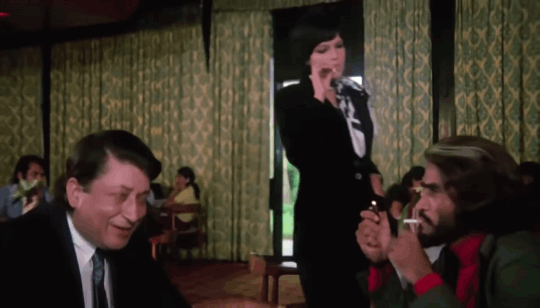




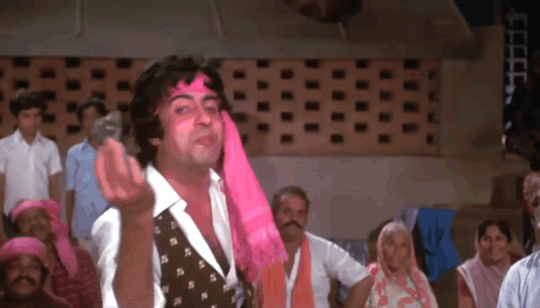

Queerness in Indian Media
↳Film: DON (1978, Hindi) dir. CHANDRA BAROT
Don follows two characters: Roma (Zeenat Aman), a woman who is out for revenge against the crime boss Don, who killed her brother and sister-in-law, and Vijay (Amitabh Bachchan), a street performer who looks exactly like Don and is recruited to help take down his gang.
In an era where women characters wore long hair and dresses and were often in the narrative simply to be romanced, Roma learns karate and judo, chops off her hair, dons a suit, and infiltrates Don's gang. While she does trade in these more masculine traits for feminine clothes and longer hair at later points in the movie, it is always with the intent of disguise--and in the climactic scene, she is back in her suit, punching and kicking the bad guys right alongside the men.
In contrast, Vijay is far more feminine than the average male action hero. However, he is never ridiculed by the narrative for these qualities--he is comic relief at times, but the joke is never his femininity. Furthermore, he is guardian to two children while their father, Jasjit (Pran), serves a prison sentence. Vijay is a caring substitute father who will do anything to ensure that the children are happy, healthy, safe, and educated--a delightful characterization given society's disinclination to allow gender non conforming people around children. While disguised as Don, Vijay adopts more masculine mannerisms (something he has to learn how to do since, as he says, 'Don shoots at the drop of a hat, while I don't even know how to play marbles!'), but he often reverts to his old style as well.
Most surprising, however, is the end of the movie, when Roma, Vijay, Jasjit, and the children all walk off into the sunset together--a family that would be considered extremely unusual in today's times, much less the 1970s.
#bollywood#don#queerness in indian media#this movie is just shenanigans from start to finish and I love it#don't think about the logic. shhh. just have fun.#the wikipedia page has some interesting facts about the making of it and the songs#anyway I love roma and vijay. I love when they find out each other's secret and it's all like#ohhh I felt so drawn to you....I felt that you were like myself.....I felt I can trust you.....#gays recognizing each other. if I do say so myself!#the metaphor is there! it's a salim-javed movie too so! I see it! I see the vision!
130 notes
·
View notes
Text
In my DragonFly (yes, that's their ship name) ideas, Beelzebub has the face of the first actress, until she's discorporated during childbirth. I have to keep it in mind. 😶 Because, I keep picturing Shelley. I just... I can't stop thinking of Shelley as Beelzebub.
Satan's faceclaim is William Miller from Warrior Nun in my fics. I mean... You have to admit, they'd make an insanely attractive couple. 👀


(Only, imagine Satan with longer black hair, and icy blue eyes)
#diary pages#writing journal#good omens#good omens beelzebub#good omens satan#otp#dragonfly#lucifer/beelzebub#beelzebub x lucifer#good omens brainrot#good omens fanfiction#good omens fandom#shelley conn#william miller#he's honestly shocked he didn't take her into his arms earlier#because they've wanted each other deep down ever since before the rebellion#and she's been his loyal second in command for millenia she's the logical choice to make his queen#and give birth to an antichrist loyal to her father#ofcs i have to add the whole discorporated thing for drama#and to explain why a very white character's mother appears indian
4 notes
·
View notes
Text
youtube
India and Israel: Celebrating over 70 Years of Friendship. #israel #india #torah #bible
Please 🙏 Re blog My posts, And Follow Torah Apologetics, thanks 😊.
#youtube#logic#jerusalem#torah study#jew#jewish#torah#israel#palestine terrorist#india love#indian#israel independence day#india#israel hamas war#palestinian terrorism#palestine#artists on tumblr#islamic jihad#islamic#islam#love#tel aviv#facts#sephardic#hebrew bible#bible#muslim#hamas war crimes#apologetics#gaza strip
3 notes
·
View notes
Text
Holy shit idiots WTF have YOU gotten right?
Constructive criticism is always welcome, silos, condescension and lack of SPECIFIC concerns, drilled down to detail annoy me to no end. Say something meaningful. Please don't projectile vomit bullshit as buzz words. That kill solutions.That would be'WRONG!


I see a lot of women patting themselves on the back and even more men who.make decisions on behalf of myself, my mother and daughter. I've seen very little competence. I see a lot of asking other women to literally and metaphorically take the punch for your lack of a spine. I concede it could be my natural bitterness. 💋
Be specific, I need followers.🤣🤣🤣🤣🤣👏
I also hide behind avatars.

Plus I come from a generation of idiots that can't read social cues or address anyone directly.
Passive aggression is my only MO.
#millenials#fucking morons#wrong#media criticism#logic#debate#womens rights#fake feminism#indian feminism#femicide
2 notes
·
View notes
Text
Interlocking Logic Circuits in Railway Signalling: Safeguarding Train Movements Interlocking Logic Circuits in Railway Signalling form the neural framework of railway signalling systems. These circuits are responsible for enforcing rules that prevent unsafe train movements, ensuring that conflicting routes are not set simultaneously and that points and signals work in harmony.For more details visit here:- https://sensedgetss.wordpress.com/2025/04/15/railway-signal-interlocking-logic-simulation-system/
#rams in railways#railway signalling automation companies#indian railway signalling systems#interlocking logic circuits in railway signalling#railway automation companies#electronic interlocking system in railways
0 notes
Text
Why Not Sweeping When Someone Leaves for Work Matters
“Sweeping when someone leaves for work is more than just a superstition—it’s a belief tied to prosperity, energy flow, and mindful living.” Sweeping When Someone Leaves for Work: Practical and Cultural Reasons The belief is widely followed in many Indian households. It states that one should not sweep or mop the house when someone is leaving for work. While this is often attributed to…
#Cultural Beliefs#Daily Rituals#Indian Traditions#Myth And Logic#Positive Energy#sweeping#Tradition Decoded#Vastu Shastra
0 notes
Text
Truly perplexing that Twitter is recommending me extremely racist poc…. Why are you showing me people gleefully declaring and cheering mass deportations and reporting them for money…
#allie.txt#if it’s not this it’s poc saying how Indians smell or bodyshaming Latinos#no amount of not interested muting and blocking helps me#to make matters worse today some guy on the train was muttering how glad tr*mo was back to bring back common sense and logic like???#they keep recommending me this shit and I’m noticing a disturbing trend there#but I fear it’s related to an issue that is out of my depth so I can’t properly articulate it
0 notes
Text
the "you can't identify into oppression" sound bite might be one of the biggest headscratchers out there because for one thing yes you can, and for another you oftentimes don't even need to do any identifying. for someone who converts to judaism for their spouse it doesn't exactly matter whether they personally actually identify as 'a jew' if their synagogue gets a bomb threat to terrorise them. Balbir Singh Sodhi was a victim of an anti-arab and anti-muslim hate crime regardless of the fact that he was neither arab nor muslim but an indian sikh. if a country criminalises same-sex relations a straight male prostitute accepting male clients because there's more money in it will be no less at a severe risk for lacking internal homosexual orientation. all that which is generally subsumed under "oppression" absolutely does not 1:1 correspond to whether or not its targets internally match a specific criterion and to insist otherwise is strikingly stupid. whether a demographic can be considered "oppressed" is if anything to be determined by observing their situation in reality, not by making spiritual arguments along the lines of "they have X-intrinsic essence, therefore Y-effect must inherently be drawn to them; or they don't have X-internal quality, therefore i have logically determined Y-effect can't possibly follow."
1K notes
·
View notes
Text
At the outset of H. G. Wells’s The War of the Worlds (1898), Wells asks his English readers to compare the Martian invasion of Earth with the Europeans’ genocidal invasion of the Tasmanians, thus demanding that the colonizers imagine themselves as the colonized, or the about-to-be-colonized. But in Wells this reversal of perspective entails something more, because the analogy rests on the logic prevalent in contemporary anthropology that the indigenous, primitive other’s present is the colonizer’s own past. Wells’s Martians invading England are like Europeans in Tasmania not just because they are arrogant colonialists invading a technologically inferior civilization, but also because, with their hypertrophied brains and prosthetic machines, they are a version of the human race’s own future.
The confrontation of humans and Martians is thus a kind of anachronism, an incongruous co-habitation of the same moment by people and artifacts from different times. But this anachronism is the mark of anthropological difference, that is, the way late-nineteenth-century anthropology conceptualized the play of identity and difference between the scientific observer and the anthropological subject-both human, but inhabiting different moments in the history of civilization. As George Stocking puts it in his intellectual history of Victorian anthropology, Victorian anthropologists, while expressing shock at the devastating effects of European contact on the Tasmanians, were able to adopt an apologetic tone about it because they understood the Tasmanians as “living representatives of the early Stone Age,” and thus their “extinction was simply a matter of … placing the Tasmanians back into the dead prehistoric world where they belonged” (282-83). The trope of the savage as a remnant of the past unites such authoritative and influential works as Lewis Henry Morgan’s Ancient Society (1877), where the kinship structures of contemporaneous American Indians and Polynesian islanders are read as evidence of “our” past, with Sigmund Freud’s Totem and Taboo (1913), where the sexual practices of “primitive” societies are interpreted as developmental stages leading to the mature sexuality of the West. Johannes Fabian has argued that the repression or denial of the real contemporaneity of so-called savage cultures with that of Western explorers, colonizers, and settlers is one of the pervasive, foundational assumptions of modern anthropology in general. The way colonialism made space into time gave the globe a geography not just of climates and cultures but of stages of human development that could confront and evaluate one another.
The anachronistic structure of anthropological difference is one of the key features that links emergent science fiction to colonialism. The crucial point is the way it sets into motion a vacillation between fantastic desires and critical estrangement that corresponds to the double-edged effects of the exotic. Robert Stafford, in an excellent essay on “Scientific Exploration and Empire” in the Oxford History of the British Empire, writes that, by the last decades of the century, “absorption in overseas wilderness represented a form of time travel” for the British explorer and, more to the point, for the reading public who seized upon the primitive, abundant, unzoned spaces described in the narratives of exploration as a veritable “fiefdom, calling new worlds into being to redress the balance of the old” (313, 315). Thus when Verne, Wells, and others wrote of voyages underground, under the sea, and into the heavens for the readers of the age of imperialism, the otherworldliness of the colonies provided a new kind of legibility and significance to an ancient plot. Colonial commerce and imperial politics often turned the marvelous voyage into a fantasy of appropriation alluding to real objects and real effects that pervaded and transformed life in the homelands. At the same time, the strange destinations of such voyages now also referred to a centuries-old project of cognitive appropriation, a reading of the exotic other that made possible, and perhaps even necessary, a rereading of oneself.
John Rieder, Colonialism and the Emergence of Science Fiction
#words#hg wells#fiction#science fiction#colonialism and the emergence of science fiction#john rieder
482 notes
·
View notes
Text
It's called toast bread/Toastbrot in German (shortened to Toast) because here it is bread almost solely for the purpose of being TOASTED. It's linguistics, plain and simple.
While we're on the subject of baked food, please tell me where you're from and what this is called.

#I have had the probably stupidest argument with some english speakers about this topic and I will again#god beware language and culture work in a way that isn't English-American in some places. world-shattering assertion I know.#where was the (American?) person getting really mad about the Indian Spider-Man making fun of 'chai tea' or 'naan bread'#same logic really
4K notes
·
View notes
Text
Hey everyone, France says it doesn’t like “imperialism” in the Indo-Pacific.



French president: “There is in the Indo-Pacific and particularly in Oceania new imperialism appearing, and a power logic that is threatening the sovereignty of several states - the smallest, often the most fragile.”

Some stuff.
“Thanks to its overseas territories, France has an exclusive economic zone of nearly 11.7 million square kilometers, 93 percent of which is in the Indo-Pacific”:

"French military presence” in the Indo-Pacific:
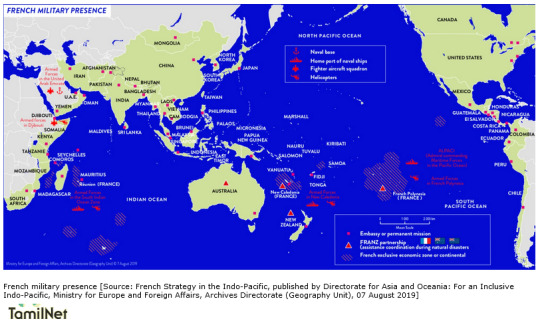
Areas of Pacific and Indian oceans actively patrolled/monitored by French forces:
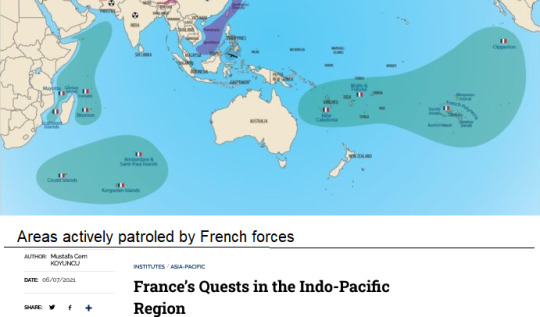
Tahiti and much of Polynesia?

French military presence in Africa:

Nations obligated to use the notorious CFA franc, subject to imposed debt conditions and French-directed investment and lending:
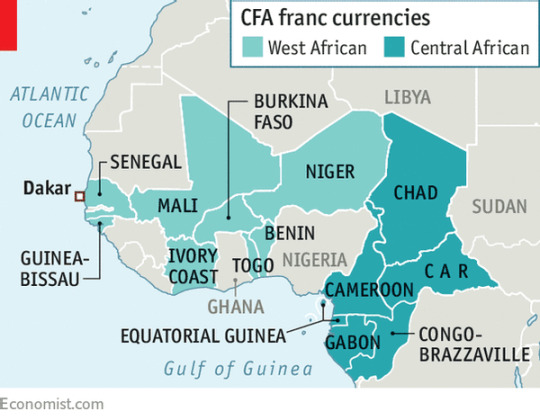
From July 2023, “President Macron reaffirms French ownership of New Caledonia” (one of the largest islands in the South Pacific, where in recent years Indigenous Kanak people have advocated for independence from France):


Overseas departments of France in the Indian Ocean (places still officially/formally administered by -- “part of” -- France):

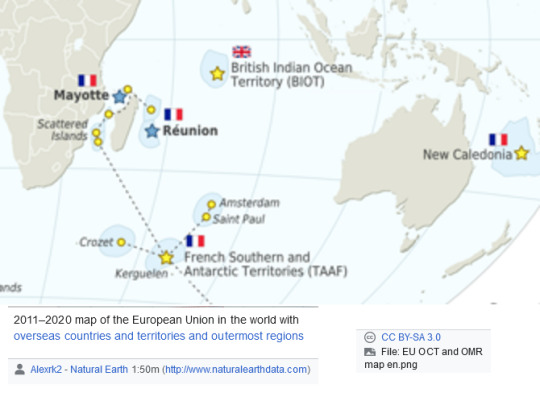
Look at some of the recent dates of “independence” for these French colonies:

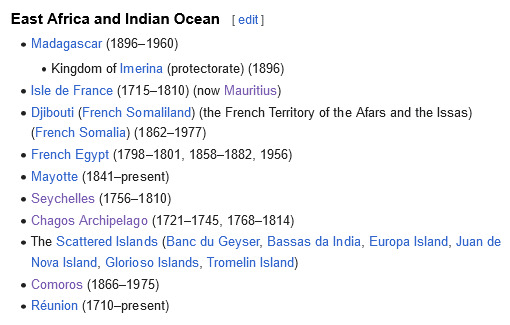
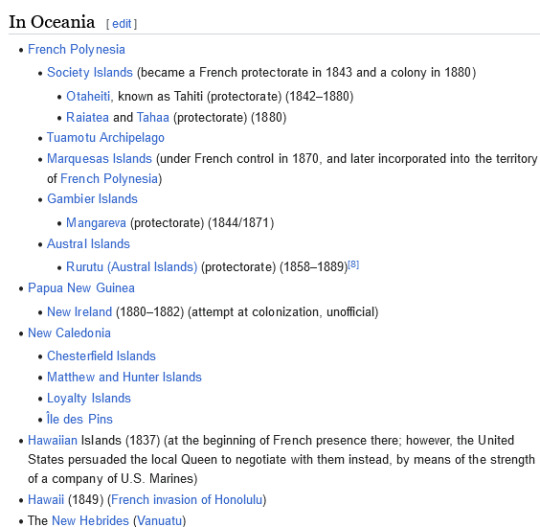
“From 1966 to 1996, France carried out 193 nuclear tests in the South Pacific”:

“France’s exclusive economic zones”:
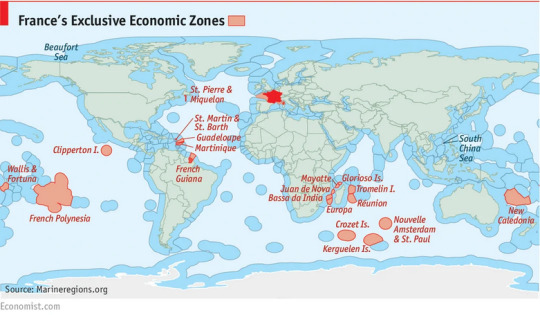
“French military presence in the Indo-Pacific”:


3K notes
·
View notes